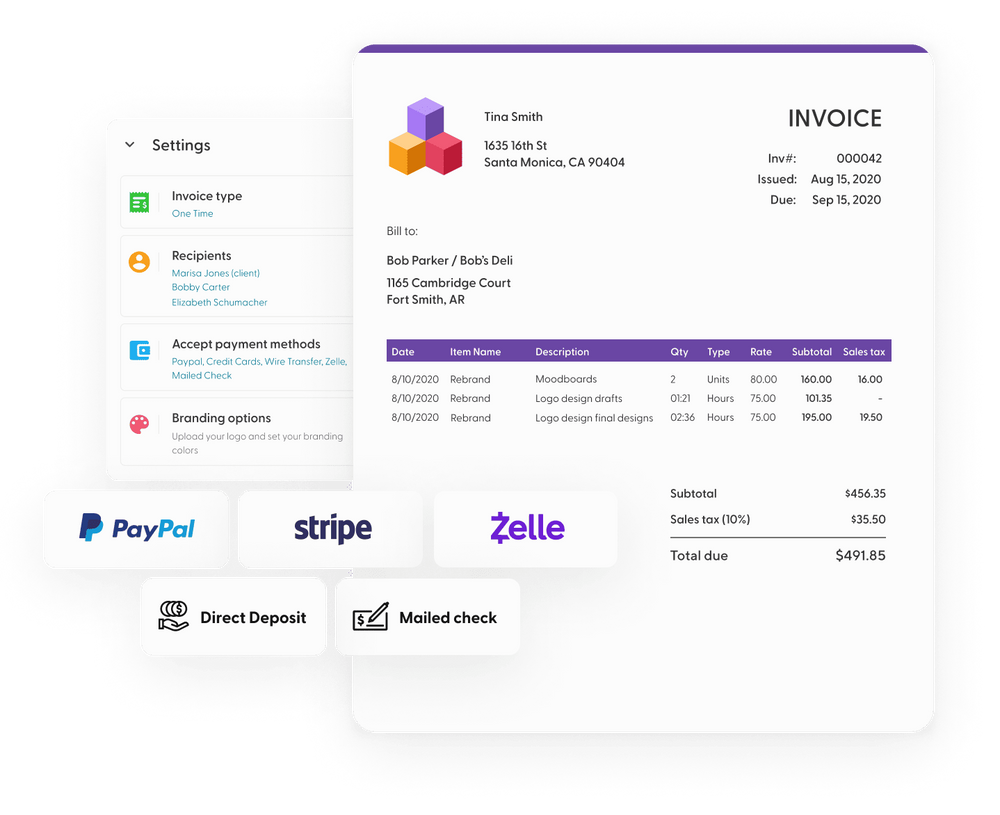Paying taxes is a legal requirement for every citizen, whether corporate employed, self-employed, or a freelancer.
If you’re a self-employed blogger and earn money through your blog, you may be worried about whether you need to pay blog taxes.
Even though tax paying is mainly associated with brick-and-mortar businesses, people who make money online are not exempt from paying taxes.
The Internal Revenue Service (IRS) is probably one of the most well-known government agencies, especially regarding tax tracking. It is responsible for collecting taxes from people who work for businesses and corporations, including bloggers who earn money through ad revenue or affiliate links.
If you make money blogging, the IRS will audit your bank accounts and impose penalties for tax evasion if you don’t file your tax returns.
As a self-employed blogger, you may be unaware of the tax regulations for bloggers. It's not as complicated as you might think. However, there are certain things that you need to understand before filing your taxes.
This article highlights several tax tips for bloggers like you and will help you understand what you need to know about paying taxes and filing your returns. It will also let you know how to schedule your tax filing to ensure you don’t forget or run out of time.
Why pay taxes as a blogger?
Like any other business, your blog needs to pay taxes if you make money from it.
Many bloggers have incorporated their blogs with multiple income streams such as ad revenues, affiliate links, or selling digital products like eBooks.
According to IRS guidelines, these sources of income qualify as self-employment and are therefore eligible for income tax.
With every source of income you make, the IRS requires you to submit a portion to finance state and national projects. You are, therefore, required to pay an estimated amount of taxes every quarter and file your annual tax returns.
Paying taxes is the law, and the IRS leaves no wiggle room for it.

What happens if you don’t pay your taxes? Well, the tax man will come after you and audit your accounts. They’ll audit every transaction recorded between you and your bank for the period you’ve been operating and charge you a heavy penalty for tax evasion.
That’s why you must start paying your blogging taxes and filing tax returns before you fall prey to an IRS audit.
What taxes should you pay as a blogger?
Before you start filling in your tax forms, make sure you understand the blog taxes you should be paying and which ones do not apply to you. In addition, you must understand the blog tax deductions and the freelance tax write-offs involved.
Some of the taxes you should pay as a blogger include:
Self-employment tax
Self-employment tax is the first tax you should pay as a self-employed blogger.
This is the tax levied on sole proprietors or independent contractors involved in any business, whether full-time or part-time. It’s a Social Security and Medicare tax for people who work for themselves.
For employed citizens, this tax is often withheld from their monthly salaries and is quite different from income tax. To know whether your blog is subject to self-employment tax, figure out your net profits or losses. You can figure it out by subtracting your net expenses from your net income.
Once you know whether your blog is making profits or losses, you can use this information to fill the tax return forms 1040 or 1040-SR accordingly.
Income tax
As a citizen, you’ll also need to pay income tax, which is often imposed on all income-earning citizens by the federal government.
Income tax is payable regardless of whether you are corporate employed or self-employed. Your tax amount depends on the federal tax rate and may increase as your income increases. The percentage of income tax will also vary with your income tax bracket, which still depends on the amount of money you make from your blog.
However, if your monthly earnings are below the minimum taxable income, consider yourself exempted from paying income tax.
The minimum taxable income is the amount of money that can be taxed, depending on the income type. Currently, the minimum taxable income in America is $12,950 annually for single filers. If your annual blog earnings are below this amount, you’re not required to pay income tax.
Allowable expenses
You also need to understand your allowable expenses before filing your tax returns.
Since your blogging income will be taxed as business income, certain expenses are allowable and often deducted from your total revenue.
These expenses are excluded from the tax deduction, and the resultant net income is what will be taxed.
Some allowable expenses for bloggers include:
- Domain hosting expenses
- Freelance consultation payments
- Salaries
- Rent expenses
- Insurance
- Utility expenses (e.g., electricity bills)
- Advertising
- Office supplies
- Other convenience expenses
How much tax should you pay as a blogger?
Whether you're a seasoned blogger who has never paid taxes or just starting as a blogger, you are probably curious about how much money you need to hand over in taxes.
And while there is no way to know exactly how much tax bloggers pay, it's important to know how much income your blog makes to estimate the amount of blog taxes you owe.
Bloggers pay an estimated percentage of their net income to quarterly tax. Therefore, you should set aside an estimated 30-40% of your blogging income to pay taxes. However, this percentage varies from one state to another.
You can always confirm your state tax requirements to know the percentage of tax you should pay according to your state government.
If you’re in doubt about your state tax rates, consider speaking with an accountant or a specialist who can guide you and help you understand your taxes thoroughly.
Quarterly tax payments for bloggers
It takes some time and preparation for you to submit and file your tax returns on time as a blogger.
The best thing to do is start early, so you have enough time to finish everything before the deadline. Otherwise, you'll be scrambling at the last minute.
Since your taxes are not automatically deducted from your blog earnings, you should plan and remit your estimated taxes every quarter. Currently, the due dates set by the IRS are April 15th, June 15th, September 15th, and January 15th (of the following year).
If you miss filing your blog tax returns within these due dates, you may find yourself paying extra cash as a penalty for late remission.
Remember, you need to pay income tax within the same year you earned the income. If the income tax exceeds the threshold, you’ll need to pay it in installments, otherwise known as advanced tax.
As a blogger, you need to keep records of your monthly income and expenses since you need that information when filing your quarterly blog tax returns. While keeping these records can be a challenge in addition to all the other activities involved in blogging, it’s the only way to shield you from financial loss due to cash penalties.
Keep yourself updated on your quarterly state and federal income taxes and pay the tax bill as soon as possible before your due date. A free calendar tool, like Indy’s Calendar, can come in handy to help you schedule and track the tax dates to avoid missing the deadlines.
How can I pay taxes on my blog income? (Blog tax tips)
As a self-employed blogger, paying blogging taxes and filing tax returns is a continuous process that you should always keep your eyes on.
Read further to get more tax tips for bloggers related to how you need to prepare, pay, and file your blog tax returns every quarter.
Stay organized with your tax preparation
Before you start filing your tax returns, make sure you have all the receipts for your purchases and expenses, including any items used for business purposes.
Receipts for allowable expenses are also necessary as they will prove that you spent money on those items, which will help lower your tax rates.
When filing your taxes, have everything organized correctly so that the process does not take too much of your time and energy. Whether you’re manually filing your taxes online or automatically using tax software, organized paperwork makes the process easier and more effective.
Some of the records you need to keep for the purpose of filing blog tax returns include:
- Receipts
- Transaction records
- Affiliate earnings
- Business expenses
- All profits earned
If you’re keeping physical records, it’s necessary to have digital backups (e.g. Electronic photos) for reference and security purposes in case the physical records get lost or destroyed.

The ultimate guide for paying your blog taxes
The following guidelines will help you understand how to file your blogging taxes according to the type of blog you run.
Define your kind of business and the legal entity
As mentioned earlier, before you file your blog taxes, you need to define your kind of business and know the legal entity under which it falls.
Do you run your blog for fun as a hobby? Do you use it as a part-time source of income? Or are you a full-time blogger who depends on your blog for a living?
Tax management and bookkeeping tend to be quite different for each of these types of blogs. For instance, if you run a commercial blog that earns a lot of money through ads and sales of digital products, your bookkeeping will be more intensive than someone who runs a hobby blog.
The three phases of blogging (and the tax processes involved)
Let’s look at the process of filing returns for each of the three phases of blogging.
The hobby blogger
As a hobby blogger, you run your blog solely for fun or use it as a platform for showing your creativity.
You probably haven’t thought of making money from it since you have other good sources of income. Many hobby blogs run for months or years without making a dime, and that’s because the owner has not given it a business mindset.
If you want to transition from hobby blogging and start making profits, you must start approaching your blog with a business mindset.
This involves tracking matters such as business plans, bookkeeping, tracking expenses, maintaining schedules, and keeping records. The IRS offers more tips to help you understand whether your blog is a hobby or a business.
As a hobby blogger, you file your blogging tax returns by simply filling out the standard 1040 tax form. One tax disadvantage for hobby blogs is that they have limited allowable freelancers tax deductions—they can only deduct up to the profit they make.
For instance, if you made $600 in a particular tax year, your allowable deductions are only $600 since you do not have other business-related expenses.
Part-time blogger (side hustle)
Once you start treating your blog as a business and start making a relatively higher amount of money from it, you transition from a hobby blogger to a part-time blogger.
It now becomes your side hustle, which supplements your primary source of income.
From a tax perspective, a part-time blog requires more work than a hobby blog. However, the work involved is relatively less than a full-time blog.
So, how do you file your taxes as a part-time blogger?
It’s pretty simple. All you need to do is fill out the standard 1040 tax form and attach a Schedule C if you are the sole proprietor. The Schedule C form outlines all your expenses and extra income from your part-time blog. This makes work easier since you don’t need to file your blog tax returns separate from your personal tax returns.
Remember to always keep all the records of income and expenses related to your blog for a more convenient tax filing process.
Full-time blogger
If your blog starts making significant income and you transition to a full-time blogger, the tax dynamics also change significantly.
Your full-time blog is now a separate business entity, and you need to file its returns separately from your personal tax returns.
Registering your blog as a limited liability company (LLC) will not only give you some extra tax advantage but also let you enjoy more legal protection.
Some of the tax returns you’ll need to file as a full-time blogger include:
- Your personal taxes
- Self-employment taxes
- Income return tax for the business
- Payroll tax if you have other employees (Not necessary if you run the blog solely)
Legal entity for filing your blog returns
The process of filing blog tax returns will also depend on the legal structure under which you registered your blog—whether you registered as a sole proprietor, a partnership, an S corporation, a C corporation, or a limited liability company (LLC).
Most hobby blogs are registered under sole proprietorships, while high-earning blogs are often registered as LLCs.
How do you choose the legal entity under which to register your business? What are the advantages involved with each?
Let’s look further into that.
Sole proprietorship
You can choose to register your blog as a sole proprietorship with the state and local governments. However, this makes you personally responsible for any legal or financial obligations (including debts) associated with the business.
If you register as a sole proprietor, you’ll file your blog taxes alongside your personal tax returns by attaching a Schedule-C form. This is pretty straightforward.

S Corporation
Registering your blog as an S Corporation means you can report your blog income on your personal tax return form. It’s a viable option if you run your blog alongside other partners since S Corporations allow up to 100 shareholders.
Filing taxes under S Corporation is simple, and what's more, there’s no double taxation involved.
C Corporation
If you register as a C Corporation, your blog becomes a separate entity from you, and you need to file a separate tax return for the business in addition to your personal taxes. You don’t need to attach the Schedule-C form.
However, this legal entity is subject to double taxation and will impose unnecessary expenses on your blogging business.
Limited liability company (LLC)
This is the most common legal structure under which most full-time blogs operate.
For full-time bloggers, LLC is the best legal entity to register your blog. This is because it separates your personal life from the business; hence, you cannot be held responsible for any associated debts or legal issues. It also exempts you from double taxation and makes you pay fewer taxes.
For this type of blog, you also have to file your business tax returns separate from your personal tax returns.
The tax filing process is very simplified, and you’ll need to pay ongoing taxes to continue operating. In most states, the annual tax rate for LLCs is $0-$50. Always confirm your state LLC rates before filing your returns.
Understand the 1099-MISC form (tax form for bloggers)
If you’re a blogger who earns money from multiple income sources, including affiliate links, you’ll receive a form known as the 1099-MISC from your affiliate partners at the end of every financial year. Here are some of the benefits of being a 1099 employee.
This form shows a statement of every income you’ve earned from a certain company, and you’ll use that information to file your returns.
However, you may not receive the form if your blog makes less than $600 annually. Similarly, you may not receive the form if your blog operates as an LLC, S corporation, or C corporation.
Understand and take advantage of tax deductions
One tax concept that many bloggers fail to take advantage of while filing their taxes is freelancer tax deductions.
As a blogger, some freelance tax write-offs or business expenses can be deducted from your taxable income. Tax write-offs help lower your payable taxes, thereby saving you money. For instance, if your blog made a net profit of $50,000, but you had zero records of expenses, then your taxable income becomes $50,000.
However, if you have kept records of expenses worth $10,000, which are declared deductible by the IRS, then your taxable income can be written down to $40,000. This means you will pay less tax at the end of the year.
It’s, therefore, beneficial to keep records of all your business expenses since every expense has the potential to lower your payable taxes.
Bank tax tips for bloggers
When you start accumulating real income from your blog, the best thing to do is to open a separate bank account for your blogging business.
This is the account you’ll be using to make all transactions related to your business and will make it easier to track your earnings and expenses.
You’ll also use credit and debit cards for this account for software subscriptions and to pay for miscellaneous expenses like business lunches.
Bookkeeping may be a challenge if your business shares the same bank account with your personal finances.
If you have a separate bank account and credit cards for your blogging business, it will save you time and money (to outsource tax management) at the end of the year when it's time to file your blog tax returns.
Bookkeeping tax tips for bloggers
Whether you’re a part-time or full-time freelance blogger, bookkeeping will help you know what’s bringing you more money and help you gauge whether you’re making profits or losses.
It will also help you set future goals for your business and know where to focus more effort to increase your earnings.
According to your financial capabilities, you can decide to outsource bookkeeping by hiring a professional or do it yourself (DIY).
- DIY: If you’re competent enough, you can do your own bookkeeping and save your business the extra cost of outsourcing. Just ensure it doesn’t consume so much of your time that you have less time left to handle other activities.
- Hiring Out: While hiring out will cost you extra cash for paying the professional, it may save you a lot of time, which you can put into other money-making activities for your blog.
Blog tax and accounting FAQs
Are you still confused? Do you still have questions on taxation for bloggers? We’ve got you covered. Here are some frequently asked questions.
Do bloggers pay taxes?
Yes. Bloggers pay taxes according to the amount of income they earn from their blogs. Most have multiple income streams, including affiliate links, ad revenue, and sales of digital products.
According to the IRS, bloggers are self-employed people and, therefore, must pay taxes like other self-employed citizens with brick and mortar businesses.
Do I have to pay taxes on my blog?
Absolutely. If your blog earns you any income, you need to pay taxes and file annual tax returns. Your blog is your business, and if you don’t pay taxes on it, the IRS will soon catch up with you.
They will audit your bank accounts and impose financial penalties on your business for failure to file tax returns.
What taxes do freelancers have to pay?
Freelancers are self-employed individuals and have to pay self-employment taxes. These taxes are normally used for Social Security and Medicare expenses by the local and federal governments.
Additionally, freelancers should pay income tax, which is a federal tax requirement for all American citizens.
How much do bloggers pay in taxes?
Bloggers pay approximately 30-40% of their income to taxes annually. The rate varies from one state to another. Before paying your taxes, confirm the tax rates for your state to avoid underpaying or overpaying taxes.
The amount of tax paid increases with the amount of income a blogger earns from their blog.
How do bloggers file taxes?
Bloggers file taxes according to the legal entity under which their blogs operate. For blogs registered under sole proprietorship, they file their taxes by simply filling the standard 1040 tax return form and attaching a Schedule C form.
For S Corporation blogs, they simply include their income taxes with their personal tax return form. However, for C Corporations and LLCs, the business is a separate entity, and the blogger has to file its returns separately from their personal tax returns.
What can bloggers write off on taxes?
When filing their returns, bloggers write off allowable tax deductions from their taxable income, making them pay lower taxes.
Some business expenses written off from taxes for bloggers include freelance consultation expenses, advertising, insurance, salaries, domain hosting expenses, and office supplies.
How do taxes work for bloggers?
For bloggers, their taxes are only estimates since they do not have a standard income from which the IRS can deduct income tax.
Therefore, they work on a pay-as-you-go basis, meaning that bloggers should pay taxes continuously (every quarter) to avoid the risk of falling behind schedule, unlike employed individuals who file their taxes annually.
Final thought on taxes for bloggers
As you can see, paying taxes and filing tax returns should be an essential part of your business, whether you blog for fun, as a side hustle, or for a full-time income. The information here can even help you to become a tax blogger and enlighten others on the space.
While you may not find it essential for a blog that makes pennies, it’s a good idea to start filing returns early enough if you predict future income growth. It also comes in handy when setting financial goals for your blog.
One thing you need to do is to track your transactions and get your bookkeeping right at all times. Keeping consistent records will make the process of filing blog tax returns less of a hassle for you.
If tax management is daunting to you, you can outsource by utilizing digital bookkeeping tools or employing a tax professional to do the bookkeeping and tax management for you.
You can also use calendar tools like Indy’s Calendar Planner, which is a free tool to help you stay on track and avoid falling out of schedule, which may cost your blogging business financial penalties.



